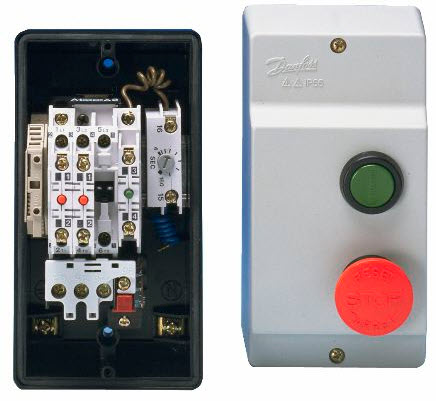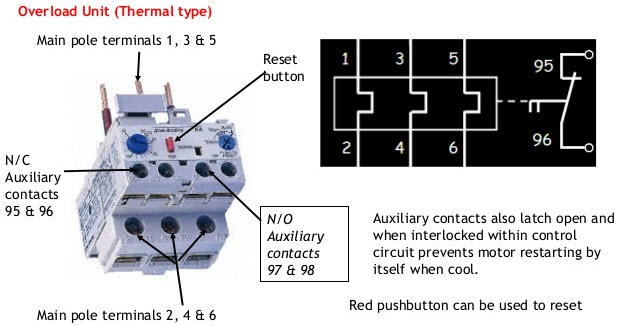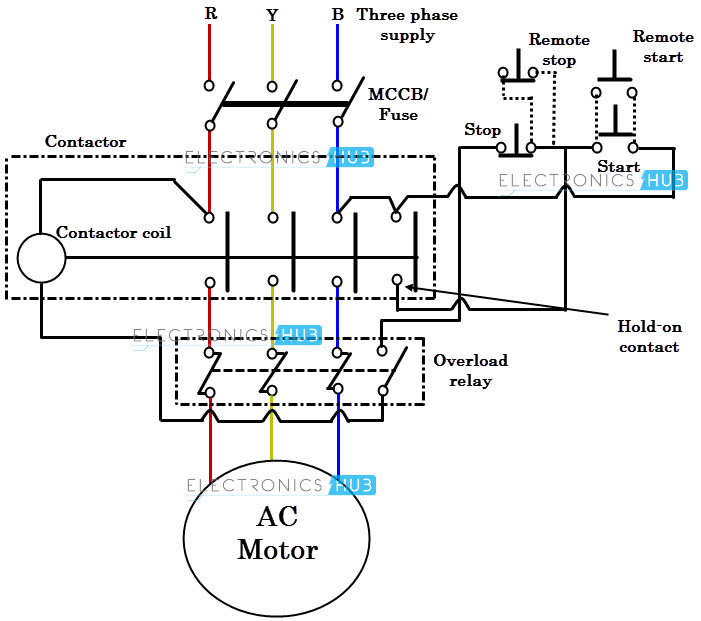The use of DOL starters is restricted up to smaller rating motors, as these starters do not limit the starting current. The essential elements of a DOL starter include a main contactor and protective devices. Let us discuss this starter in detail.
Direct-on-Line (DOL) Starter
It is an easiest method for starting up three phase induction motor in which stator windings of the motor are connected directly to the main supply. When an induction motor is connected to the three phase supply, a very large current typically 5 to 8 times the full load current flows through the motor. This heavy current reduces as the motor accelerates to its rated speed.
If induction motor is connected directly to the supply, the starting current will not damage the motor unless it is started and stopped repeatedly over a short span of time. If large rating induction motors are connected directly to the supply, a heavy starting current can damage the motor and also cause disturbance of voltage, i.e., voltage dip on mains supply. This can lead malfunctioning of other equipments connected to the same supply.
This is the reason why DOL starters are limited to small rating motors where distribution system (mains supply) can withstand high starting currents without excessive voltage dips. For a large rating motor, ranging from 5 HP to 25 HP, oil immersed DOL starters are used which provides insulation against sparking on contact points and hence increases the life of starter. DOL starter consists of MCCB, contactor, and overload relay. It acts as a switch under normal working condition by providing the means to switch ON and switch OFF the motor. It holds the switch ON condition when motor is running by the use of latch mechanism and interrupts the flow of current to the motor once the stop button is pressed. It also incorporates the overload tripping mechanism that can be operated by either thermal or magnetic overload trips. These tripping mechanisms are activated when there is a sustained increase of current flow through the starter.
Construction or Parts of DOL Starter
It consists of two push buttons, one is a green button for starting the motor and the other is red for stopping the motor. The switching of power supply is carried through an electromagnetic contactor which can be 3 or 4 pole contactor. This electromagnetic contactor has three NO contacts that connect the motor to the supply line while fourth contact (also called as an auxiliary contact) works as hold-on contact when the start button is released in order to energize the contactor coil. This auxiliary contact (NO or NC) makes the contactor to be electrically latched while motor is operating and these contacts are less power rated than three main NO contacts. If any reason, power supply fails or voltage drops excessively, it releases the latch by de-energizing the coil and thus motor disconnected from the supply.
The contactor coil is connected in series with a start button, stop button and overload trip mechanism. This connection is called control circuit which is generally energized from two lines of three phase supply via a step down transformer.
Overload Protection
DOL starter is also provided with overload relay to protect the motor from overloads. The overload relays are provided with heating elements inside of which bimetallic strips are arranged. When excessive current flows through the motor, overheating causes to damage the motor winding. The overload coil becomes hot when the over current flows through the motor. This causes to expand bimetallic strip and thereby opens the trip contact.
This overload mechanism should operate at 20 to 30% overload. When the overload coil trips, the current through the contactor coil stops flowing and hence the contactor contacts come to the OFF position. Overload relays are provided with current adjuster such that tripping coil current can be adjusted depending on the load protection requirement. In some DOL starters, overload relays can be magnetic or electronic type. In magnetic type, electromagnetic coils are energized when the excess current flows and they are not affected by the temperature. In electronic type, solid state components operate the tripping mechanism and they are ideally used in precise applications.
Working of DOL Starter
The wiring connection of DOL starter with start and stop buttons is shown in figure below. The DOL starter main terminals are connected between the mains supply terminals and motor terminals while the control circuit is energized with two terminals of three phase supply as illustrated in figure.
When the start button is pressed, current will flow through one phase to the control circuit and the contactor coil to the other phase. This current energizes the contactor coil which makes to close the contacts thereby three phase supply is connected to the motor. Since the start button is of pushbutton, when it is released the control circuit still maintains the supply through hold-on contact. If the stop button is pressed or overload relay coil operate, the current path through contactor coil will break and hence the contactor contacts drops out, thus breaking the supply to the motor. Once the power supply is interrupted, again the supply to the motor is established by pressing the start button. The thermal overload protection relay operates depending on the heating effect of the load current. When the load current heats the thermal coils, bimetallic strip inside of it expands such that it trips out the spring-loaded contact in the control circuit. The speed at which relay operates decided by the current adjustment. Typically it will be four to five times the rated motor current. DOL starter can be operated remotely for remote control switching of motor from any number of desired places. For remote control switching one should remember that, all the remote ON push buttons must be connected in parallel to ON pushbutton of the starter whereas all remote OFF push buttons must be connected in series with OFF pushbutton of the starter. Connect the remote ON and OFF switches as shown in dotted line in the figure for remote control operation.
Advantages of DOL Starter
It provides high starting torque. Simple to use and most economical. Control circuitry is simple to establish and troubleshoot. Easy to find fault and make necessary connections. More compact in size and thus occupies less space.
Disadvantages of DOL Starter
High starting current, typically in the range of 6 to 8 times the full load current The inrush current of large motor may cause a big voltage dip or drop in electrical supply system which will affect other electrical appliances connected to it. The unnecessary high starting torque required by the load may cause increasing mechanical stresses on motor mechanical parts as well as the loads. It is not feasible for high rating motors, typically above 10 KW
Image Contributors I’ve been told if the motor is rated over 1 hp then you need to introduce A DOL starter, is this correct as I can find no guidance or regulation covering this Many Thanks Dean Barnes Comment * Name * Email * Website
Δ









![]()